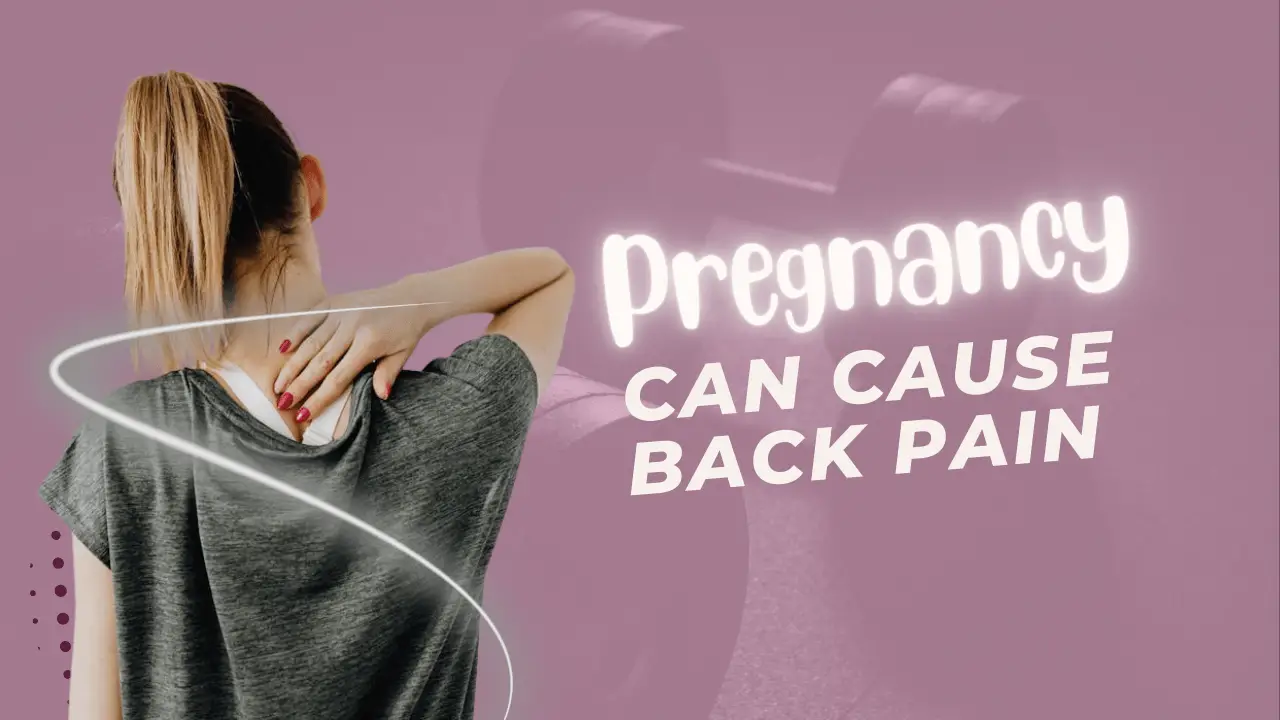Many expecting mothers have back pain, and knowing why this occurs is essential to effectively managing discomfort. A woman’s body experiences major changes throughout pregnancy, which may have an effect on her general comfort and well-being.
One significant issue is that pregnancy can cause back pain, owing to changes in posture, hormone fluctuations, and extra weight. By taking care of these problems as soon as possible, you can reduce suffering and enhance your quality of life during this crucial period.
In this article, we’ll go over practical strategies for treating and avoiding back discomfort so you can concentrate on enjoying your pregnancy.
Understanding How Pregnancy Can Cause Back Pain:
Pregnancy can cause back pain due to several interconnected factors that alter a woman’s body mechanics and physical condition. The body experiences several physiological changes during pregnancy that are intended to help the developing baby, but they can also put stress on the back.

- Hormonal Changes: The body releases the hormone relaxin while a woman is pregnant. It helps to loosen the ligaments and joints in the pelvis to prepare for childbirth. While this is beneficial for delivery, it can also lead to instability in the spine and contribute to back pain.
- Weight Gain: The weight of the growing baby and the increased fluid retention puts extra stress on the spine and back muscles. This added weight shifts the body’s center of gravity, leading to poor posture and strain on the back.
- Postural Changes: As the baby grows, the uterus expands and pushes forward. This shift causes an increase in the curve of the lower back, known as lordosis. The altered posture places additional pressure on the lumbar spine, resulting in discomfort and back pain.
- Muscle Strain: The growing belly requires the abdominal muscles to stretch and weaken, which reduces their ability to support the spine. This decreased support forces the back muscles to work harder, leading to fatigue and pain.
By understanding how pregnancy can cause back pain, expectant mothers can better manage their discomfort through targeted strategies and adjustments to daily habits.
Common Symptoms and Causes:
Pregnancy can cause back pain through a range of symptoms that vary in intensity and location. Identifying these symptoms is crucial for managing and alleviating discomfort effectively.
- Lower Back Pain: One of the most common symptoms is lower back pain, often felt in the lumbar region. This pain usually results from the increased weight and pressure on the spine, as well as changes in posture due to the growing belly. It can range from a dull ache to sharp, shooting pain.
- Pelvic Pain: Pain in the pelvic region is another frequent complaint. This can be attributed to the loosening of the pelvic ligaments, which are essential for childbirth. The added stress on these ligaments can lead to discomfort and a feeling of pressure in the pelvis.
- Sciatica: Some pregnant women experience sciatica, which is characterized by pain radiating down the leg from the lower back. This occurs when the growing uterus presses on the sciatic nerve, causing pain, numbness, or tingling sensations in the legs.
- Postural Strain: Changes in posture due to the growing uterus can lead to muscle strain and back pain. As the center of gravity shifts, the lower back may experience increased curvature and strain, resulting in discomfort and stiffness.
Understanding these common symptoms helps in recognizing the ways pregnancy can cause back pain and in taking proactive steps to alleviate the discomfort through appropriate interventions.
Effective Tips for Relieving Back Pain:
Managing and relieving back pain during pregnancy involves a combination of strategies aimed at reducing discomfort and promoting overall spinal health. Since pregnancy can cause back pain, applying these effective tips can provide much-needed relief.

- Exercise and Stretching: Regular, gentle exercises and stretches can strengthen the muscles supporting the spine and improve flexibility. Activities such as prenatal yoga and swimming are particularly beneficial, as they reduce muscle tension and promote better posture. Key stretches include the pelvic tilt and cat-cow stretch, which can help alleviate lower back pain.
- Proper Posture: Maintaining good posture is essential to minimize back pain. Expectant mothers should focus on standing and sitting with their shoulders back and their spine aligned. Using a supportive chair with proper lumbar support can also help reduce strain on the back.
- Supportive Devices: Wearing a maternity support belt or using a lumbar pillow can provide additional support to the back and pelvis. These devices help distribute weight more evenly and reduce the pressure on the lower back.
- Heat and Cold Therapy: Applying a warm compress or heating pad to the lower back can relax tense muscles and increase blood flow, providing relief. Conversely, using an ice pack can help reduce inflammation and numb the area if the pain is acute.
- Gentle Movements: Avoiding heavy lifting and making sure to use proper body mechanics, such as bending at the knees rather than the waist, can prevent exacerbating back pain. When turning or changing positions, do so slowly and with care.
By incorporating these effective tips for relieving back pain, pregnant women can better manage the discomfort associated with the ways pregnancy can cause back pain and enhance their overall comfort and well-being.
Preventive Measures:
Preventing back pain during pregnancy involves adopting habits and practices that reduce strain on the back and promote overall physical well-being. Since pregnancy can cause back pain, implementing these preventive measures can help minimize discomfort and support a healthier pregnancy.
- Maintain a Healthy Weight: Gaining excess weight can put additional strain on the back. Following a balanced diet and staying within recommended weight gain guidelines can help manage pressure on the spine. Regular, moderate exercise can also assist in controlling weight and maintaining muscle strength.
- Practice Good Posture: Proper posture can significantly reduce the risk of back pain. Expectant mothers should focus on standing tall with their shoulders back and aligning their ears, shoulders, and hips. When sitting, using a chair with proper lumbar support and keeping feet flat on the floor can further reduce strain.
- Engage in Regular Exercise: Engaging in safe, pregnancy-friendly exercises helps strengthen the muscles supporting the back and pelvis. Activities such as walking, swimming, and prenatal yoga can improve flexibility, strengthen core muscles, and promote better posture.
- Use Supportive Gear: Investing in a maternity support belt or a specially designed pillow can provide additional support to the back and pelvis. These tools help distribute weight more evenly and reduce the load on the spine, minimizing discomfort.
- Avoid Prolonged Standing or Sitting: Prolonged periods of standing or sitting can exacerbate back pain. Taking regular breaks to stretch, change positions, and walk around can help alleviate pressure on the back and improve circulation.
By incorporating these preventive measures, pregnant women can better manage the ways pregnancy can cause back pain and maintain a more comfortable and healthy pregnancy experience.
When to Seek Professional Help:
While many instances of back pain during pregnancy can be managed with self-care strategies, there are situations where seeking professional help is crucial. Since pregnancy can cause back pain, knowing when to consult a healthcare provider can ensure proper treatment and avoid potential complications.

- Severe or Persistent Pain: If back pain is severe, persistent, or worsens over time despite trying home remedies, it’s important to seek professional help. Intense pain that interferes with daily activities or disrupts sleep may indicate a more serious issue that requires medical evaluation.
- Radiating Pain: When back pain radiates down the legs or is accompanied by numbness, tingling, or weakness, it could be a sign of sciatica or nerve compression. These symptoms should be evaluated by a healthcare provider to determine the appropriate course of treatment.
- Accompanying Symptoms: If back pain is accompanied by other concerning symptoms such as fever, chills, or pain during urination, it may indicate an infection or other underlying condition. Consulting a doctor is essential to address these additional health issues.
- Unusual Changes: Significant changes in the pattern or intensity of back pain, especially if accompanied by other unusual symptoms, should be assessed by a professional. This includes pain that starts suddenly or is not relieved by standard measures.
- Pre-existing Conditions: Women with pre-existing back conditions or other health issues should consult their healthcare provider early in pregnancy. This ensures that any specific concerns are addressed and managed appropriately throughout the pregnancy.
By recognizing these signs and seeking professional help when necessary, pregnant women can better manage the impact of how pregnancy can cause back pain and ensure their health and well-being are prioritized.
Conclusion:
Maintaining comfort and general well-being during pregnancy requires effective management of back pain. Due to physiological changes, back pain during pregnancy can occur. Therefore, it’s critical to put preventative and effective alleviation tactics into practice.
Expectant mothers can manage back pain more effectively and have a healthier, more comfortable pregnancy by being aware of the symptoms, maintaining proper posture, doing the right exercises, and getting expert help when needed. Setting these tasks as a top priority will make your pregnancy easier and more enjoyable. Click to learn more.
FAQs:
- Can pregnancy cause back pain in the early stages?
Yes, pregnancy can cause back pain even in the early stages due to hormonal changes and shifts in posture as the body adjusts to pregnancy.
- What are the common causes of back pain during pregnancy?
Common causes include weight gain, hormonal changes, and altered posture due to the growing uterus, and changes in body mechanics.
- How can a pregnant woman get rid of back pain?
Relief strategies include gentle exercises, maintaining good posture, using supportive devices, and applying heat or cold therapy.
- When should I seek professional help for back pain during pregnancy?
Seek professional help if the pain is severe, persistent radiates down the legs, or is accompanied by other concerning symptoms like fever or urinary pain.
- Are there preventive measures for back pain during pregnancy?
Yes, preventive measures include maintaining a healthy weight, practicing good posture, engaging in regular exercise, using supportive gear, and avoiding prolonged standing or sitting.

1 thought on “Pregnancy Can Cause Back Pain: Effective Tips for Relief and Prevention”